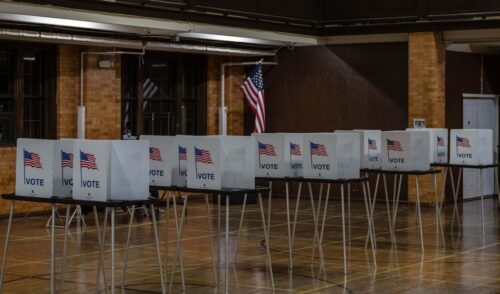The Gilder Lehrman Institute of American History has been awarded the 2022 Leonore Annenberg Institute for Civics Award by the Annenberg Public Policy Center to develop a high school program on the role of the states in determining and protecting voting rights.
The $200,000 prize will be used to create and pilot-test a new curriculum that will be introduced for Constitution Day 2023.
The Gilder Lehrman Institute of American History is a nonprofit, nonpartisan organization based in New York City that is dedicated to K-12 history education and serves the general public. It is based around the Gilder Lehrman Collection, an 80,000-document archive that covers 500 years of history, from Columbus’s 1493 letter describing the New World to documents and images from the civil rights era through the end of the 20th century, including such treasures as the Declaration of Independence, the U.S. Constitution, and the Emancipation Proclamation.
“The central idea behind this project is that many of us in the civics and history sphere recognize that there’s a general lack of knowledge about how important state and local authorities are in determining who gets to vote, how, and when,” said Tim Bailey, the Gilder Lehrman Institute’s director of curriculum development and instructional design. “Many people think it’s a federal responsibility and they don’t realize the huge significance states and local authorities have that impact voting.”
The project was selected by judges for the Leonore Annenberg Institute for Civics, a project of the Annenberg Public Policy Center (APPC).
“We’re excited to see the results of the Gilder Lehrman Institute’s timely project on voting rights, connecting history with current events,” said Ellen Iwamoto, who runs APPC’s Leonore Annenberg Institute for Civics. “Teachers, students, and the general public will benefit from the educational materials developed through this project.”
The landscape of voting rights laws
The project is being launched as states across the country seek to enact legislation to reshape voter access and the electoral process. As of mid-January 2022, legislators in at least 27 states had introduced, pre-filed, or carried over 250 bills with provisions to restrict voting while legislators in at least 32 states had introduced, pre-filed, or carried over 399 bills to expand voting access, according to the Brennan Center for Justice.
Although amendments to the Constitution have extended the right to vote – in 1870, the 15th Amendment extended it to Black men; in 1920, the 19th Amendment extended it to women; and in 1971, the 26th Amendment extended it to 18-year-olds – the Constitution does not explicitly guarantee everyone’s right to vote, leaving it to the states to decide “the times, places, and manner” of elections. “It’s important that everybody understand how all of these pieces fit together,” Bailey said.
The voting rights project
The Gilder Lehrman Institute’s project aims to teach the history of voting rights from the Constitution to today and examine how those rights evolved over time, with a focus on the role of the states in defining voting rights and procedures.
The project will include the commissioning of a series of essays written by eminent historians for high school students; lesson plans, including an active civics component in which students will discuss and debate current voting-rights legislation and issues in their states and be encouraged to make their voices heard; traveling and digital exhibitions; a two-hour teacher professional development course on voting rights; and a project roll-out at a Voting Rights National Forum on Constitution Day 2023.
The Leonore Annenberg Institute for Civics Award

The Gilder Lehrman Institute’s project was selected from proposals submitted by some of the 39 partners in the Civics Renewal Network (CRN), a consortium founded by the Annenberg Public Policy Center of nonprofit, nonpartisan organizations dedicated to strengthening civic life in the United States. The Leonore Annenberg Institute for Civics Award aims to further an exemplary and ambitious project that would improve civics education in the nation’s elementary, secondary, or high school classrooms. The competition is open to organizations that are partners in CRN.
The first LAIC Award was presented in 2019 to the Edward M. Kennedy Institute for the United States Senate to create resources to help 8th through 12th grade teachers conduct productive civic conversations on difficult issues. The next award, in 2021, went to Street Law to develop a curriculum for middle and high school students on the rule of law.

